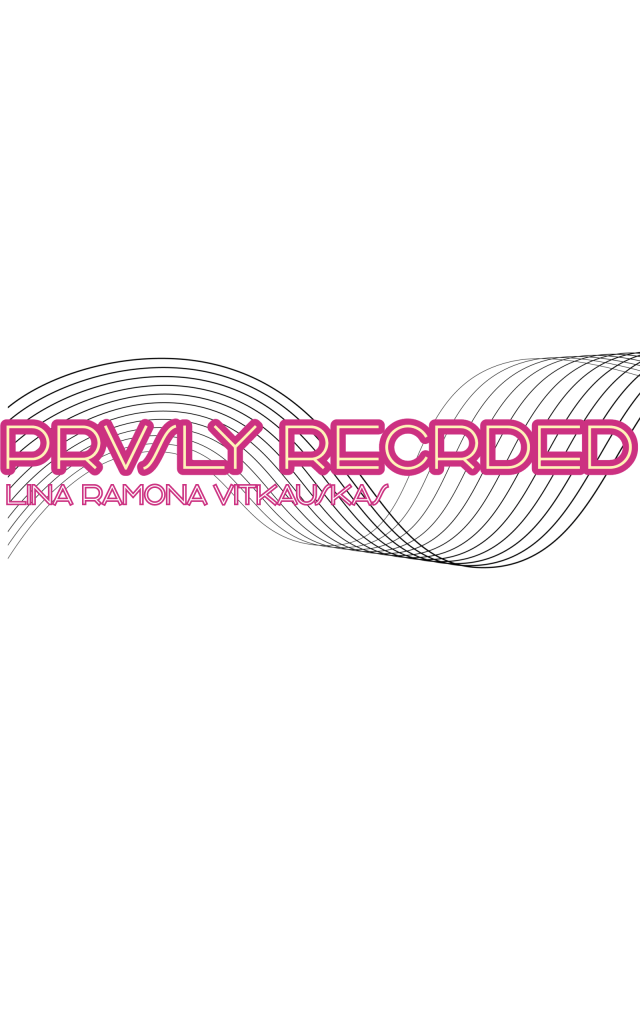
NEW E-BOOK (POETRY + COLLAGE)
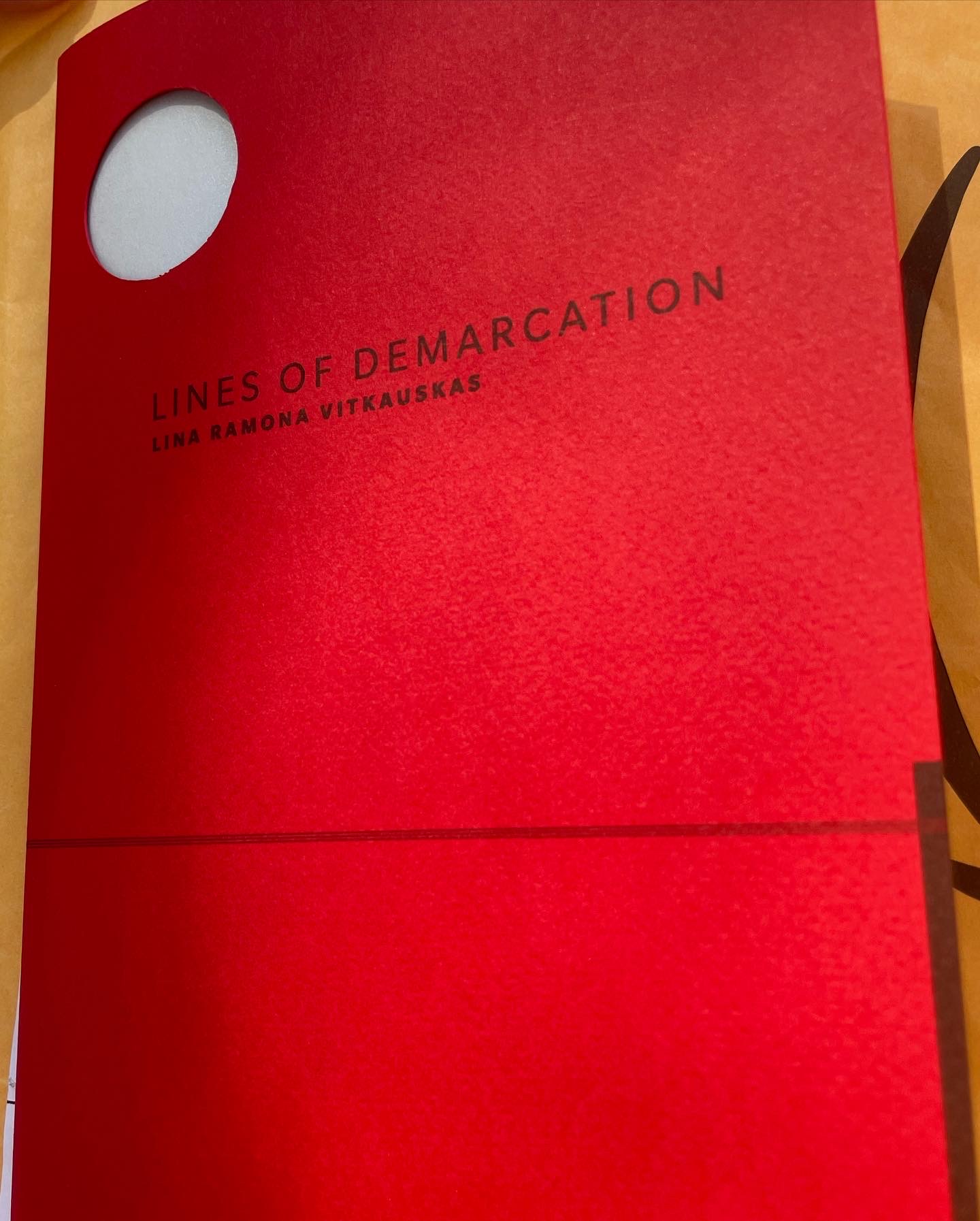
LINES OF DEMARCATION
(JackPine Press, 2022)
Available via JackPine Press: https://jackpinepress.com/catalog/
Pre-pandemic, the world had already begun dangerously shattering into digital social fragments, hubs and echo chambers of disin-formation, and commodifiable, market segmentations.
As individuals, we’ve been navigating the parameters and depths of isolation, and on a broader, geopolitical scale, our politics, gen-erational worldviews, and growing social injustices have further divided us.
Written throughout late 2020 and early 2021, this collection of poems explores physical, emotional, political, and psychological divisions.
When one thinks of literal, external lines, images, and/or meta-phors of lines, ideas of defined borders, divides, crossings emerge. Internal schisms (our collective mental health in crisis) also sur-face. Yet who or what determines these lines — who creates these divisions? What separates us — keeps us from making meaningful, logical, and human-centric connections and conclusions?
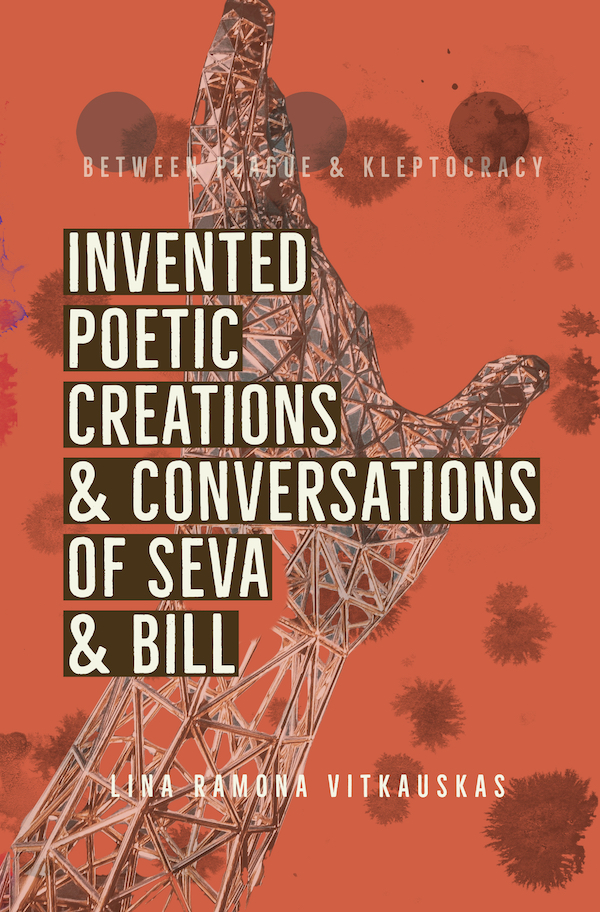
Between Plague & Kleptocracy: Invented Poetic Creations & Conversations of Seva & Bill
(Secret Airplanes Press, 2020/2021) This collection cross-references poems of two dead poets: Vsevolod Nekrasov and Bill Knott. The poet serves as medium, picking up bits of posthumous conversations and imagined collaborations between the two poets. Vitkauskas hybridizes and recreates their texts, projecting possible dialogues during a perilous time in history: of pandemic, forced isolation, economic decline, and global governments finding themselves with packs of kleptocrats and their sycophants overtaking these systems. “…the ‘values’ of the kleptocrats would [soon] become America’s own. This grim vision is now nearing fruition.“ —Franklin Foer, The Atlantic (Mar 2019) “In our new world of ‘alternate facts’, corruption is ‘no longer a sign of a failing state, but of a state succeeding in its new purpose’. The new kleptocrats have subverted their nations’ institutions, ‘to seize for themselves that which rightfully belonged to the commonwealth.’ “ —Tom Burgis, Financial Times journalist (Review, Charles Kaiser, The Guardian, Oct 2020)
CA$25.00

Ministry of Foreign Affairs (MOFA)
(Secret Airplanes Press, 2018) In most countries, the Ministry of Foreign Affairs (MOFA) is the government department responsible for state diplomacy as well as for providing for the country’s citizens abroad—often displaced persons. This collection of recorded “releases” (poems) takes the idea of a government entity created to protect its citizens and applies it to the author’s parents—MOther & FAther— displaced people of WWII who experienced immigrant hardship and inherited PTSD, which triggered abuse and addiction, and who were then unequipped to protect their children (citizens) from the epigenetic trauma of displacement. This is the author’s protective document; these are her “papers.”
CA$20.00

White Stockings
(White Hole Press, 2015, 2016, 2019) The White Stockings are said to be female Baltic snipers, so named by the Russians during the Chechen wars of the 1990s. The story goes that beautiful, blonde women-warriors reminiscent of pagan myths were trained as biathletes—ready to cross miles of rugged terrain and wait patiently for hours upon the cold, barren floor of border-Russian forests to assassinate their given targets. The story got a boost when newspapers reported the capture of several female snipers from the Baltics, however, other papers reported that the stories were absolute myth, attributing the creation of these mysterious “mercenaries” to paranoia and convoluted historical facts. Whether or not the White Stockings exist, these poems enter their world. A fictional sniper is the subject of each poem, examining her conscience, perspective, doubts, fears, or determination.
CA$25.00
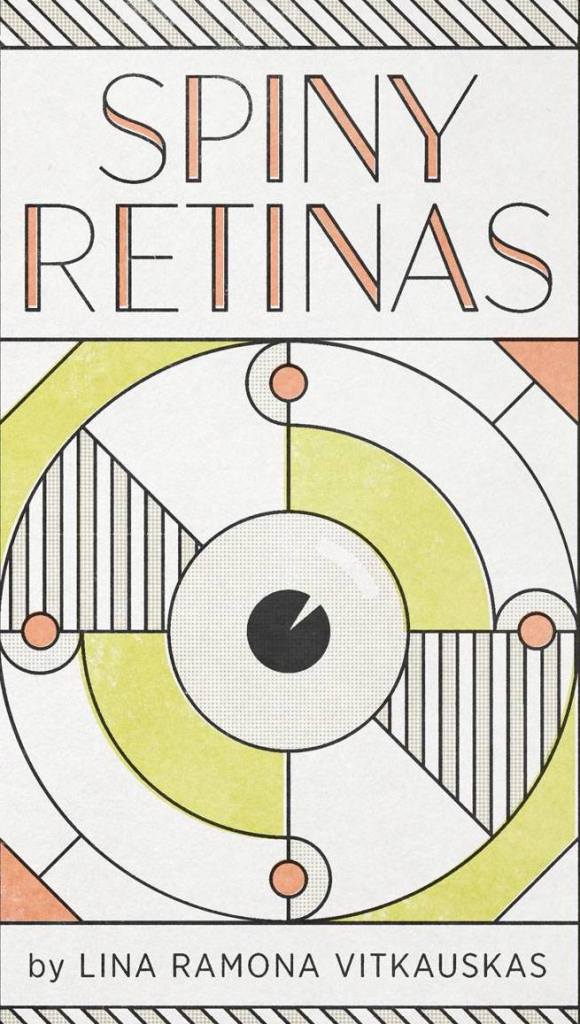
SPINY RETINAS
(Mutable Sound, 2014) SPINY RETINAS an epic poem, or if you prefer, a narrative poem, or perhaps still if you prefer, a “hybrid text piece” that was compiled slowly over the course of six years (2006–2012). It was constructed using automatic writing technique and addresses and/or speaks to war, politics, and religion (stereotypes and cultural myths explored through use of military and theological hierarchical titles); rape culture, gender roles, and sexism; and pop culture in general. The following books, films, and/or television shows were used as reference points to create SPINY RETINAS: – I Dream of Jeanie episodes, – John Ashbery’s Girls on the Run, – David Lynch’s Lost Highway, – Jennifer Chambers Lynch’s Boxing Helena, and – Richard Brautigan’s Trout Fishing in America. The piece was created using aleatoric method/approach and poetic language was used carelessly, unabashedly, often with such extreme force the author found herself shaking simultaneously with utter pleasure and despair. It was a freeing exercise, like running around nude in a random suburban neighborhood at 2 a.m. with a clear squirt gun or picking the first cucumber of the season or even hanging upside down on the monkey bars.
CA$20.00
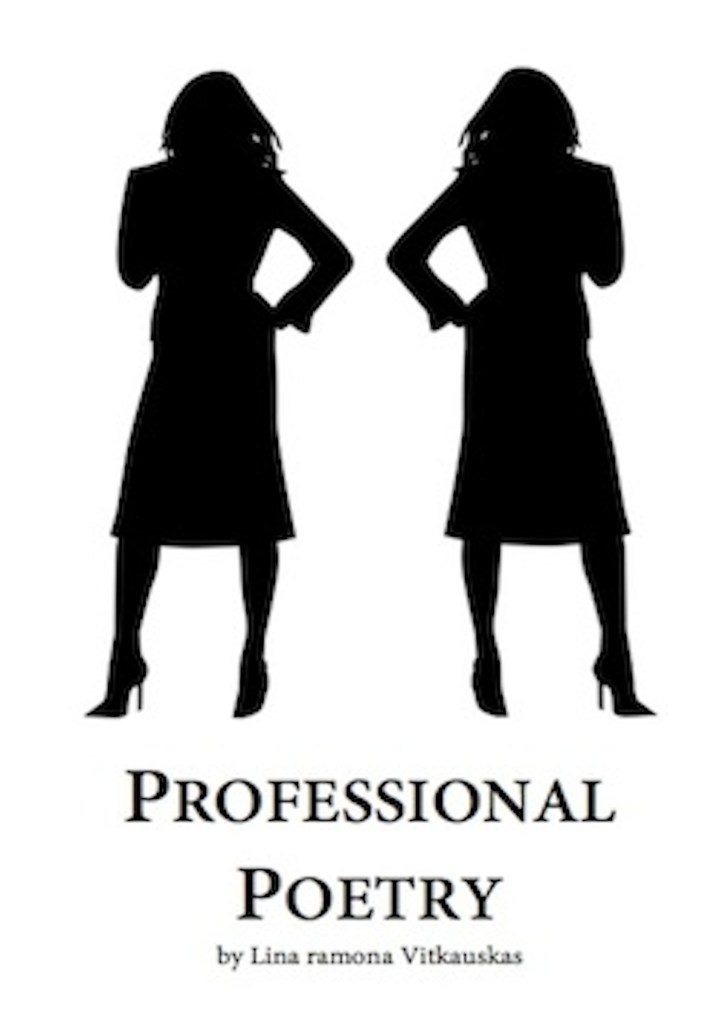
Professional Poetry
(White Hole Press, 2013) The Alice in Wonderland of labor/work poems. Consume these poems and you’ll grow larger (like a giant businessman) and hear a new America singing as you tumble through the White (Rabbit) Hole.
CA$20.00
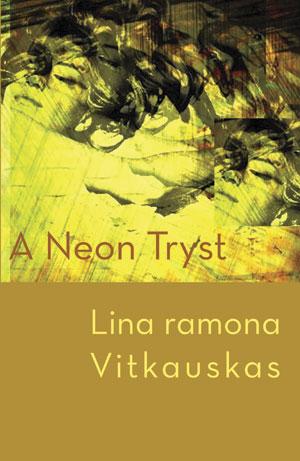
A Neon Tryst Shearsman Books, 2013
“The ‘trysts’ of Lina Vitkauskas’ book are shot through with ‘neon’—that is, they are saturated with chemicals, textures, atmosphere, and media. According to this synthetic cosmology, ‘In an affair/arms laugh,/they become sheer.’ That is to say, they—arms, bodies, weapons, trysts—become both medium and adjective, both see-and material. As in Antonioni’s great films, the body is clothes and the clothes are part of the visual atmosphere. A dress moves through a toxic landscape, or a ‘toxic love.’ The ‘trysts’ are movies, fantasies, art. Vitkauskas is ‘surreal, primitive, impressionist, whatever.’ ” —Johannes Göransson, The Sugar Book (Tarpaulin Sky, 2015)
“It’s a book of codes and lost histories, grainy film stock and the harder-to-catch frequencies, and there’s a Pynchon-esque bend to the work overall, a sense that the images of these films are being translated into other tongues, maybe even languages we don’t speak ourselves, languages that might not exist. There’s a gap between the hour and the meaning. These poems are like flashing, oblique messages from a dead or yet-to-be country. From the nocturnal neon tryst between lateness and image. Between static and paranoia. When you read Vitkauskas’ book, it seems like it’s after midnight, and everyone for miles around is asleep.” —James Pate, The Fassbinder Diaries (Civil Coping Mechanisms, 2013)
“If film is linear, the ultimate time-based medium, during which we are supposed to listen and watch attentively, passively, Lina Ramona Vitkauskas’ poems in A Neon Tryst talk back. These poems create simultaneity, layers, and distillations toward new narrative logics like ‘Let’s laugh until panties.’ Vitkauskas is watching for the poem in the film, writing her own subtitles (deliciously peculiar subtitles) and in their irreverence they are expansive, wise, and sometimes very funny. Her playful gestures in the face of the tightly choreographed imprint of film create incidental and embodied new texts, and this may very well be a feminist enterprise in its daring, toppling film’s male gaze with ‘I have to half you.’ So if Bergman or narrative expectation of any stripe ever presses on you with too much force, don’t worry! Take A Neon Tryst in hand, ‘Be frothy/and rascally’ and soon you may delight in talking back to the screen everywhere, perhaps adding, with a shrug: ‘I can’t stand chalets.’ ” —Jill Magi, LABOR (Nightboat Books, 2013)
“You’ve discovered/invented a unique new kind of mode in the cinepoem genre — bravo…your method in writing the ‘film ekphrastics’ is unique, innovative, and I’ve never read of anyone else doing it before you…” —Bill Knott, The Unsubscriber (Farrar, Straus and Giroux, 2006)
“Vitkauskas receives a late-night hum, works like an interloper, transmuting the film world into her pristine hint of wink and back row auditorium smack. There is something in these poems that at times feels smarter than the films they invoke. And that’s a good thing.” —August Evans, HTMLGIANT
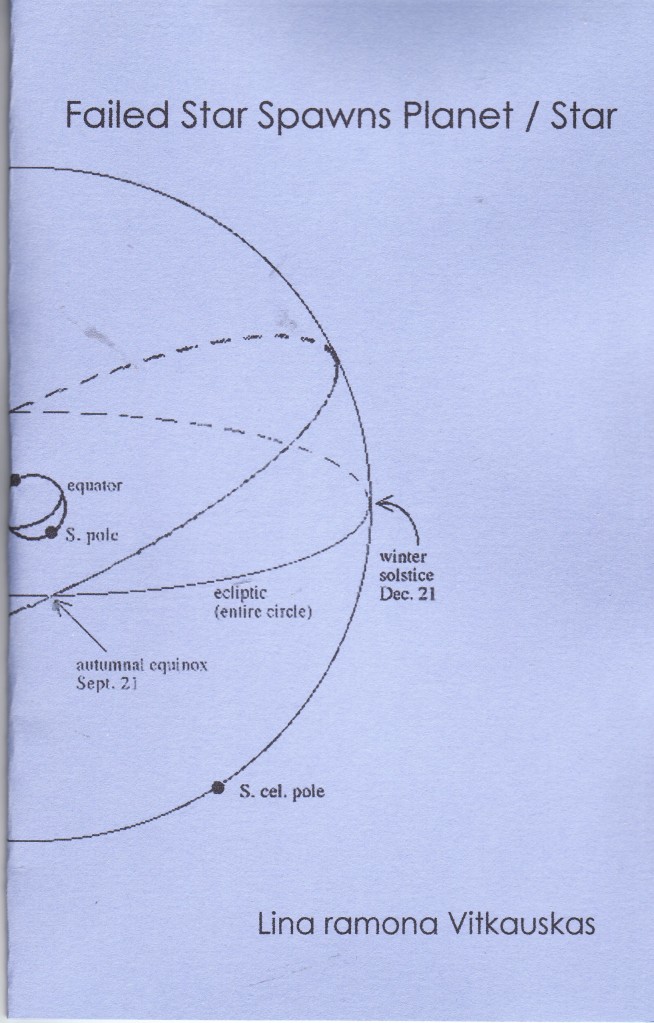
Failed Star Spawns Planet/Star
About FSSPS (excerpt from Amy Catanzano, Jacket2):
“Other poets use science as a framework for exploring questions that arise from shifting identity-based poetics and more. Lina Ramona Vitkauskas’ chapbook, Failed Star Spawns Planet/Star can be interpreted as a total translation between poetry and science as well as a non-normative treatise for feminist/non/all-gendered spacefarers. The title poem invokes the brown dwarf star, 2M1207A, ‘a peculiar cool star,’ and its companion exoplanet, 2M1207B. As an homage to this fascinating work, I used the star and its planet as the featured image for this commentary, which is also titled after the last line in Vitkauskas’ poem…”
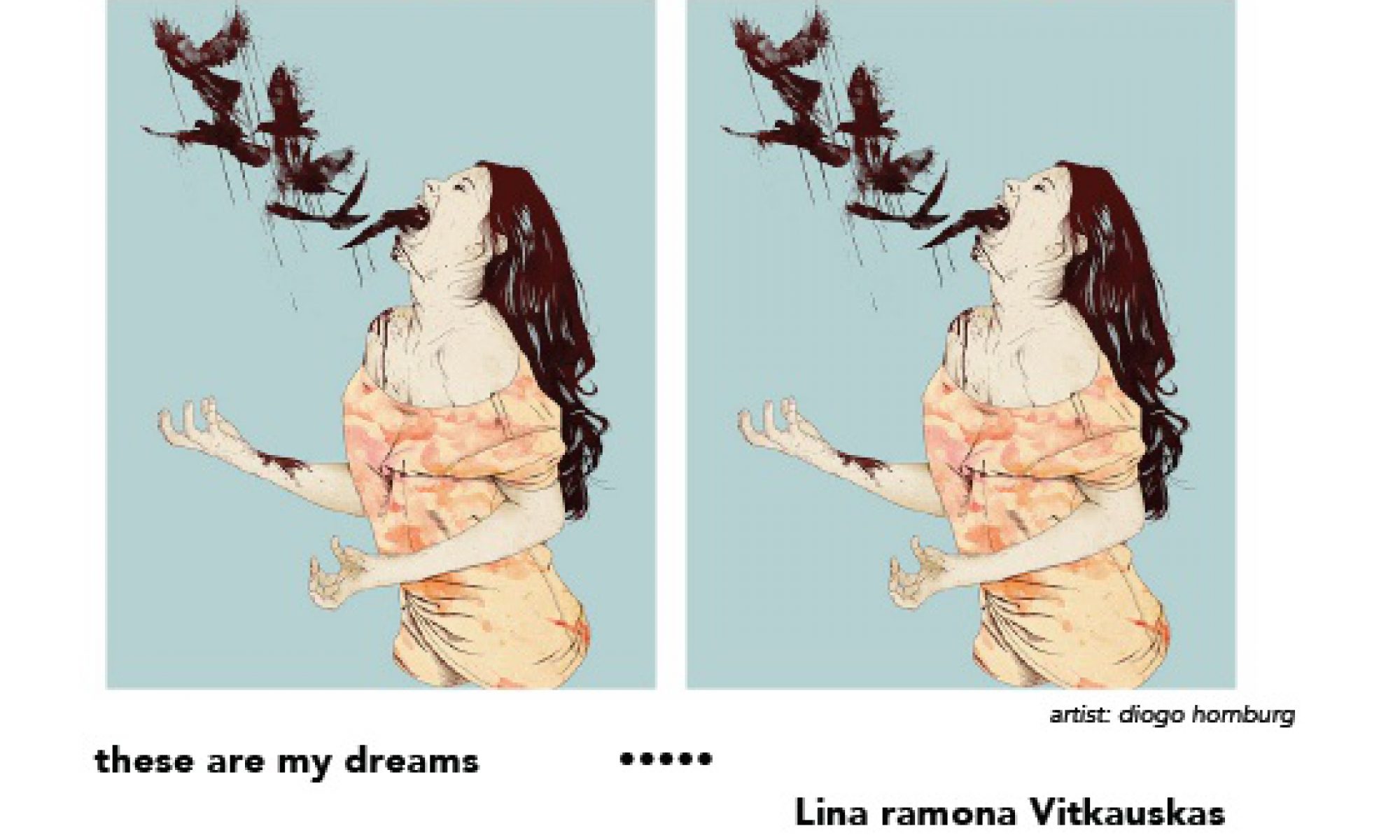
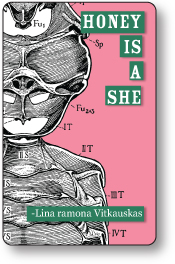
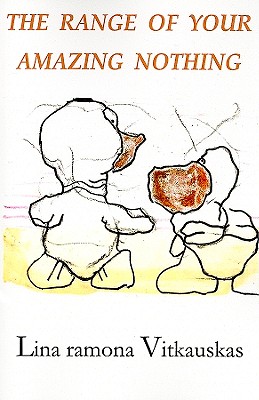
these are my dreams
White Hole Press, 2013 (PDF, e-book)
“I dream. Sometimes I think that’s the only right thing to do.”
–Haruki Murakami
“… waking is another dream that dreams of not dreaming and the death we fear in our bones is the death that every night, we call a dream.”
–Jorge Luis Borges
HONEY IS A SHE
Plastique Press, 2012 (e-book)
“Vitkauskas’ poems possess the intricate peculiarity of honeycombs and Schiaparelli dresses, as she exquisitely fashions poems out of scientific particulars, cinematic references (‘they place the horse head in the bed’), and metaphors’ associative logic. ‘These girls are brave tailors in the blur of impossible femme,’ and like her own subject, Vitkauskas is fearless as she navigates, interrogates, and ultimately, dislocates conventional gender dynamics: ‘I rip the itch from gender.’ The dynamism, humor, and marvel of her poems recall the surrealist Joyce Mansour, conveying a similar tenor as they negotiate desire and disease, ardor and animosity, with beehive fervor. Be stung and sung in the ‘golden / drip science’ of her resplendent poems.”
—Simone Muench, Wolf Centos (Sarabande Books, 2014)
“Splendid, grotesque, violent, but always loving, Lina ramona Vitkauskas writes like a contemporary Marina Tsvetaeva through a landscape of the uncertain and surreal; the language is made from the nervousness and energy of every bee in the hive. Part “rotten aorta” and part “snapdragon wine”, the poems in HONEY IS A SHE form a buzzing network of inventive beauty.”
—Sandra Simonds, Atopia (Wesleyan Poetry Series, 2019)
THE RANGE OF YOUR AMAZING NOTHING
Ravenna Press, 2010 (Out of Print)
“It is strange to occupy the world of Lina ramona Vitkauskas’ poems, a world where beef takes nebulous forms, Jacques Derrida and Batman speculatively coincide, where cumin forms into fists, where W.H. Auden sets things on fire, while Sartre cowboys ride into a present tense that combines the Handmaid’s Tale with mad science with the meaningful meaningless dialogue of politics and propaganda. But while these poems are filled with wild images, they are also subtle in their devious shifts and proclamations. The dream capsules of amazing nothings of this book are, to paraphrase Wallace Stevens, both there and not there. These poems are fun, soothingly frantic, and optimistically generous.”
—Daniel Borzutzky, The Performance of Becoming Human, Recipient of the 2016 National Book Award for Poetry
“Plathian in her wry ecstasies, generous in her nods to poet-predecessors (among THE RANGE OF YOUR AMAZING NOTHING’s quietly lyrical poems is a five-line homage to Szymborska) and sensitive to the implications, often dangerous, and joys, often overlooked, of postmodern discourse, Vitkauskas’ debut collection is a veritable treasure-trove of sonic intensity issued from a sleuth-like intelligence.”
—Virginia Konchan, Hallelujah Time (Véhicule Press, 2021)
“Lina ramona Vitkauskas’ poetry is richly textured and layered, a palimpsest pleasure. In THE RANGE OF YOUR AMAZING NOTHING, Ashbery and Superman, Lorca and Jacqueline Bisset, Nancy (the comic strip character) and Forrest Gander all coexist and inform her most amazing verse. While the bright surface of her poetry employs humor and kitsch, the dazzling underside confronts of intolerance and terrorism with a wise brilliance.”
—Denise Duhamel, Guest Editor of Best American Poetry 2013; author of ABBA the Poems with Amy Lemmon (Coconut Books, 2010)
Shooting Dead Films with Poets
Fractal Edge Press, 2004 (Chapbook, Out of Print)
“Vitkauskas writes a class of ‘found’ poetry that I will dub ‘found memory’ as she culls the rooms of the poems of the poets to whom she dedicates and finds word objects that make matter (see “Einstein’s Shoes”!) out of historical and spatial distance. Tender, defiant and fun, these poems are making it new.”
—Rachael Levitsky, founder and co-director of Belladonna
“Shooting Dead Films with Poets is an improbable treasure. These fourteen poems call out to Cocteau and draw from the gamut spanning Georgic bees and a Chicago found to be antipodal to the Volga. Subtitles twine immaculately. They invoke a Cyrillic voyeur penning captions for a movie that knows its own Democracy. This is a run of great poems made by great lines, a sequence of gracious acts in which Vitkauskas drops names like Galileo dropped the orange.”
—Chuck Stebelton, The Platformist (The Cultural Society, 2012), Winner of 2005 Tougher Disguises Jack Spicer Award